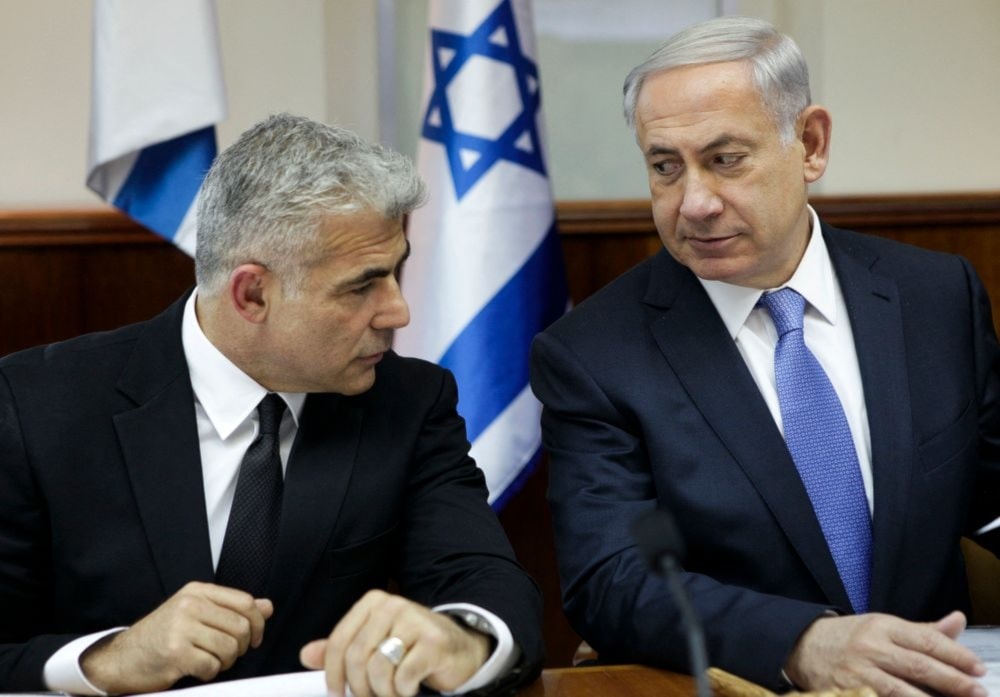Lapid says Netanyahu unfit to lead war, urges allied MKs to exit gov.
The top opposition leader suggests three candidates his party is willing to back for the Prime Minister position either through elections or an alternative government today.
-

Israeli Prime Minister Benjamin Netanyahu, (R), and opposition leader Yair Lapid during a meeting in occupied al-Quds on October 7, 2014 (AFP)
The head of the Israeli opposition Yair Lapid slammed Prime Minister Benjamin Netanyahu for not being qualified to lead the occupation entity, calling on "National Unity" MKs to leave the emergency government, Israeli newspaper Yedioth Ahronoth reported.
During a meeting for his Yesh Atid party, Lapid called on Benny Gantz, Gadi Eisenkot, and Gideon Sa’ar to exit the government, stating that “this government is unfit to lead the war” and that “Netanyahu is unfit to lead the country.”
Meanwhile, Lapid revealed three names his party sees fit to fill the Prime Minister position, including a member of Netanyahu's Likud party, Yuli Edelstein, alongside either Gantz or Eisenkot.
He declared that he would back any party or movement to change the government, whether through elections or finding an alternative government.
Read more: The Economist: Benjamin Netanyahu needs to go
Saving Netanyahu
Continuing his address, the opposition leader said that "National Unity" lawmakers joined the war cabinet following the October 7 operation since they “believed it was in the best interest of the country. It may have been true three months ago. It is certainly not true now,” Lapid said.
"This is not a unity government, this is not an emergency government. They are not saving the State of Israel, they are saving Netanyahu."
"For weeks now, the poison machine of Netanyahu and his aides has been attacking the chief of staff, the army, the commanders, and the fighters. Every meeting of the cabinet turns into a poisonous attack on the army,” and “as long as they are there, as long as they sit under Netanyahu, they give [his actions] legitimacy.”
The top opposition figure criticized the transfer of "billions of shekels" of government funds to "disgraceful coalitions" and parties in the middle of the war rather than going to the military, in reference to Israeli Police Minister Itamar Ben-Gvir, Finance Minister Bezalel Smotrich, and other "extremist cabinet members."
"It is wrong to keep Ben-Gvir, Smotrich, and [Religious Zionism Minister Orit] Sturk in power. It is not right to let them pass another criminal and corrupt budge," he said.
Read more: Supreme Court strikes down key amendment of Netanyahu's overhaul
Earlier, the leader of the Yisrael Beytenu party, Avigdor Lieberman, criticized the conduct of the war in the northern front with Lebanon.
Talking to his party, Lieberman called for a reassessment of the pattern of activity because "we are currently operating with the same concept that led us to October 7."
He also criticized "Israel's appearance before the International Criminal Court in The Hague," considering it a "mistake because we should not recognize the court's authority... we took an unnecessary risk."
Political deadlock
A new survey released last week has painted a clear picture of Netanyahu's falling popularity among Israelis.
Polling 746 settlers between December 25 and December 28, the "Israel Democracy Institute" (IDI) found that only 15% of Israelis expressed they wanted the current premier to stay in power after the war on Gaza ends, compared to 23% voting in favor of Gantz.
Lapid has been leading a campaign against Netanyahu since the beginning of the war on Gaza, citing his bad performance handling of the war.
Last November, he stated that Netanyahu "should go home, not to elections," adding that the occupation entity needs another prime minister from the Likud party, as the Israelis do not trust the current one.
One of his most notable statements was during an interview with Israeli Channel 12 also in November, when he declared, "If we cannot tell the residents of Be'eri settlement (Gaza envelope) and the residents of Kiryat Shmona (in the north) that they can return to their homes, this is considered a collapse of Zionism."
The recent elections in the Israeli entity, which saw Netanyahu's advancement over his opponents, further complicated the political deadlock of the system after four consecutive election cycles in four years, exacerbating an existing security and existential crisis, with the Gaza Resistance operation intensifying it.

 4 Min Read
4 Min Read








